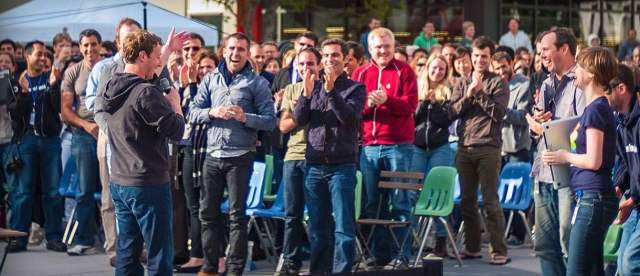Just because WhatsApp will “operate independently” doesn’t mean Facebook won’t put its 6,000-employee muscle behind its new acquisition. We’ve heard a lot about how WhatsApp will save Facebook from losing the international messaging war, but sources close to the parent company tell me it actually did a lot to help Instagram. Here are the ways you can expect it to do the same for WhatsApp.
Engineering
Instagram CTO Mike Krieger apparently wasn’t sleeping much in months before his company was bought by Facebook. In two years, Instagram had grown to 27 million registered iOS users before launching on Android where it picked up 1 million more in the first 24 hours.
Krieger was known to spend late nights fighting server fires to keep Instagram from going down like the Hindenburg. With just a dozen total employees, he didn’t have much help.  After the acquisition, Krieger could suddenly call on Facebook’s massive, world-class engineering team for help or guidance. When I saw him a few months after the deal, he’d regained his youthful glow and looked like he’d been sleeping more. Now imagine what life’s been like for WhatsApp co-founders Jan Koum and Brian Acton. I’m gonna go on a hunch and say “stressed”.
After the acquisition, Krieger could suddenly call on Facebook’s massive, world-class engineering team for help or guidance. When I saw him a few months after the deal, he’d regained his youthful glow and looked like he’d been sleeping more. Now imagine what life’s been like for WhatsApp co-founders Jan Koum and Brian Acton. I’m gonna go on a hunch and say “stressed”.
 After the acquisition, Krieger could suddenly call on Facebook’s massive, world-class engineering team for help or guidance. When I saw him a few months after the deal, he’d regained his youthful glow and looked like he’d been sleeping more. Now imagine what life’s been like for WhatsApp co-founders Jan Koum and Brian Acton. I’m gonna go on a hunch and say “stressed”.
After the acquisition, Krieger could suddenly call on Facebook’s massive, world-class engineering team for help or guidance. When I saw him a few months after the deal, he’d regained his youthful glow and looked like he’d been sleeping more. Now imagine what life’s been like for WhatsApp co-founders Jan Koum and Brian Acton. I’m gonna go on a hunch and say “stressed”.
Over the past few months their service grew to serve 450 million users with just 32 engineers, each one supporting 14 million people. In Forbes’ profile of Koum, Parmy Olson writes that during his often-missed kickboxing class “Every few minutes Koum sits down for a break, slipping the gloves off and checking for messages from Acton about WhatsApp’s servers.” Well lucky for them, the cavalry has arrived.
WhatsApp will be able to draw on Facebook’s engineering know-how and team if their code breaks or servers stumble. That could help prevent outages and make WhatsApp work even faster, even if it doesn’t get slapped with a Facebook logo or any other design changes.
Recruiting
At over 6,000 employees and rapidly growing, Facebook knows a lot about recruiting. It’s far from perfect, considering Facebook rejected Koum and Acton when the two applied to work there around 2008, and it’s seen some brain drain since the IPO. Still, the company has feelers out around the world looking for top talent.

Facebook can now pitch potential recruits a spot at WhatsApp. Sure, the upside potential is diminished now it’s already been acquired, but Facebook’s HR team can tempt people with the chance to work on an app serving almost a half a billion people.
And some of that fresh blood could come from within Facebook itself. Instagram was able to lure Facebook’s Director Of Partnerships Emily White to help it kick off its advertising effort as Director Of Business Operations (though she’s since left for Snapchat). Facebook’s star mobile product manager Peter Deng also slid over to Instagram to become its Director Of Product. When top talent at Facebook gets a bit restless, they could inject some excitement without leaving the family by hopping to WhatsApp.Considering Facebook spent $19 billion to acquire WhatsApp, I’d bet it’d be willing to pony up to pay for high-profile poaches from other companies, or even smaller talent acquisitions to bring in whole teams of great staffers. Facebook’s deep pockets could change the game for what was a lean startup.
Spam
At moments in Instagram’s history, it’s had serious spam problems. Comments with scam links, hacked accounts posting spam photos, fake followers doling out likes in hopes of a follow-back so they could spam you more. Before it was acquired, it wouldn’t allow third-party apps to post photos to its feed, and chose not to have a web presence that would invite spammers.
 Thankfully Facebook had extensive experience fighting spam. It managed to cut spam by 95% in 2010 according to former CTO Bret Taylor.
Thankfully Facebook had extensive experience fighting spam. It managed to cut spam by 95% in 2010 according to former CTO Bret Taylor.
In late 2012 it kill off 37% of fake Facebook accounts. Sources tell me Instagram got “plugged in” to Facebook’s spam prevention team, to help it get serious about integrity. Instagram began blocking spam comments posted to multiple photos, quickly squashed theSmoothie hack, and was able to open its API to posts from other apps.
For WhatsApp, Facebook’s spam fighters could help it banish malicious users and stop hackers before they steal control of people’s accounts.
The intimate nature of mobile messaging makes spam messages especially annoying. No company is 100% spam-proof, but thousands of extra Facebook engineers with domain expertise should surely get WhatsApp closer to that goal.
Growth
Facebook’s growth to 1.23 billion users is no accident. There’s a big team there dedicated to the science of adding and retaining users. They have a whole office lined with international flags and screens showing growth figures. The growth team’s tactics have become hallmarks of Facebook’s development style, as former member Andy Johns laid out in a Quora post.
 They do intense A/B testing on every feature, often pushing dozens or even hundreds of different versions of Facebook to different users through a system called Gatekeeper to measure which changes are beneficial.
They do intense A/B testing on every feature, often pushing dozens or even hundreds of different versions of Facebook to different users through a system called Gatekeeper to measure which changes are beneficial.
There’s intense funnel optimization to boost signups, get users onboarded, keep them engaged, and get them back if they lapse. Facebook even provides a totally different experience for new users designed to get them enough friends to fill their feed before they see the standard interface. Plus there’s internationalization to make sure the app is translated into every language and available on any type of phone.
Facebook’s growth team threw fuel on Instagram’s fire, helping it rocket from 27 million iOS registrations and a few million Androiders to the 150 million-plus active users it has today. It could give WhatsApp a similar boost. Already at 450 million users and 1 million more signups per day, WhatsApp hasn’t needed Facebook’s help, but now it can have it if it wants. And I expect it will.
Facebook CEO Mark Zuckerberg and Koum said yesterday that not monetization but growth is WhatsApp’s top priority. As we wrote yesterday, Facebook bought WhatsApp because its own Messenger was too far behind in the global messaging race, so expanding that worldwide footprint across devices is crucial.
When Facebook says it’ll keep its hands off, that’s more about product direction and external branding than what happens under the hood. After paying so much to wrestle WhatsApp away from Google, you can bet Facebook will do whatever it can to help it trounce SMS and the other chat apps, even if users are none the wiser.

No comments:
Post a Comment